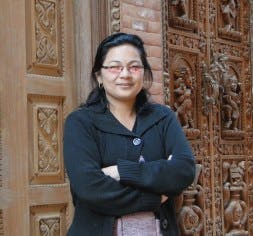Single is but a word
Jan 21, 2015
Story


The highway is brand new and stretches luxuriously all the way from Koteshwor to Bhaktapur. The newly tarred road glistens in the mid-day sun. But once you drive into Bhaktapur, everything seems to freeze all of a sudden, the state of life and its motions. Men in daura suruwal are basking beside the temple, enjoying their conversations. Women in oiled hair and bright haku patasi sarees laze with their roadside wares and dreamy eyes.
I wait for Nhuchhemaya Naga beside the Five Storied Temple. The wintry sun is wonderfully warm but I am impatient to see her. I look at faces passing by when a petite figure from far away waves at me. Nhuchhemaya must be a little over five feet. She is young and wears a black sweater along with a pair of trousers. The shades on her Polaroid spectacles have turned pink and she has a warm smile on her face. “I am sorry, I am all dusty,” she apologizes, “I am just back from our field where we plant tomatoes.” She points at her soiled shoes with her chin.
She takes me to H H Buddha Maitreya Treatment and Healing Centre, the homeopathic clinic at Pottery Square where she works besides running her organization Nepal Ekal Mahila Sashaktikaran Manch (Nepal Single Women’s Empowerment Forum) and the cooperative, Ekal Mahila Bachat Tatha Rin Sahakari (Single Women’s Saving and Loan Cooperative).
She says she is nervous and warns me that her Nepali is not too good. Just when I start to get intimidated, her eloquence fascinates me. I am one of the very few “journalists” she has ever talked to, and she has so much to talk about, so much to share.
Nhuchhemaya was married when she was just 16 years old. She lost her husband after 10 years of their marriage. “When my husband died, I felt like my world had stopped. I had lost hope. I did not open the curtains of my windows. I stacked blankets on my window pane so that no light could pass.” As she continues, I try to imagine how she must have felt to be left alone in a society that detests widows. I am happy that her sons, 9 years and 5 years old then, brought her back to life and she came out of that dark room to start an organization for the welfare of single women of Bhaktapur.
So, what inspired her to start the single women’s organization? “I used to think that I am cleverer than others. But if a person like me was broken after my husband’s death, I wondered what must happen to other women who are not as strong and confident as I am. I wanted to help other single women like me,” she shares. She knew nothing about the process and the intricacies, and knew no one who could help her. She shared the idea with her sisters, brothers, and in-laws, all of whom discouraged her saying it was no child’s play, especially with her amount of education.
She was determined, however, and nothing could change her mind. “The next day, I wore my white clothes and went around Bhaktapur District to look for widows who were mourning the death of their husbands. I met 75 such women, whom I talked to and shared my vision with,” she says proudly. A group was formed with them which marked the beginning of a journey that changed the lives of hundreds of single women in Bhaktapur.
According to the data of 2061, there were 2575 single women (a term preferred over the heavily symbolic "widows") in Bhaktapur district. In addition to losing a husband, there are several other problems that single women face in Nepal. They are considered inauspicious and are not allowed to participate in religious functions. They lack self-confidence and are depressed, afraid, and immobilized in a life that has just become even narrower with the discrimination they have faced all their lives because they are women.
After forming the group, she asked all the women to get their relationship verification certificates. “Getting the organization registered was not an easy job. No one wanted to help a widow. People did not trust me,” she complains. After repeated failures and distrust from lawyers, she finally got in touch with Raj Kumar Suwal, a lawyer from Thimi who promised to help her register the organization. “That night I could not sleep. I was restless with nervousness and excitement.” The next day, she took 7 single women to the lawyer’s firm where he prepared the minutes and the organization statute. At night, in the dark of 2 o' clock, she went to the single women’s houses to collect their citizenship certificates. “By morning, I had collected 70 citizenship certificates which I carried in a luga dhune bata (a big vessel used to wash clothes).” As she thinks about that day, she laughs. It is a heartwarming and infectious laughter. The lawyer did the paper works and the organization was registered on 15th of Jestha, 2061, only 23 days after she lost her husband.
Nyuchhemaya helps to bring single women in Bhaktapur out of isolation and dependency, and is working to breach the strong, family-enforced social customs that separate widows from participation in the citizen sector. Among many such activities is their annual celebration of Nhu Daya Bhintuna, the Newari New Year. Single women go out for a rally with fanfare, in their red clothes. “Women in Bhaktapur had never participated in rallies, but now with single women joining the bhintuna rally, we are breaking the barriers.”
In the organization, she also trains them on the role of society, culture, religion and law concerning single women. In the process, she inspires them to question the validity of the restrictions, rise above them and bring a change. By joining the company of their peers, single women are not only getting a chance to speak out, they have created a small world of their own. From grieving together to enjoying their annual picnic, the group has become one big family.
Nhuchhemaya also helps the single women find employment which, she believes is the gateway to their economic independence and self-respect. “Single women with little or no education are working in schools and hotels. Very recently, Prakash Dhaubhadel, the proprietor of Hotel Heritage in Bhaktapur has provided employment to 12 single women in its housekeeping department”, she informs me proudly. The organization also does tomato farming on its 5ropanis of land, and is planning to expand this venture in the days to come.
Through the cooperative, Nhuchhemaya also provides loans to single women to start their own ventures, the most common ones being tomato and mushroom farming. The cooperative provides loans up to 25000 rupees ($350 approx) without any collateral and above 25000 rupees with certain collateral at an interest rate of 15%. Through her efforts, hundreds of single women have been able to live an independent life rather than having to rely on the goodwill of a father-in-law or brother-in-law to give them money for their children’s schooling or even for a new sari.
As I listen to her, I cannot imagine that she is the same woman who had lost all hope after her husband’s death. “On one of the days when I had locked myself in that dark room, my eldest brother cried. That day, I decided not to cry ever. I have realized that no matter how much sorrow one carries in his or her heart, life just moves on.” Juggling her job, the organization, cooperative, and her kids is certainly not easy, but she has handled all of her responsibilities with complete assurance. She has done everything on her own, from raising her kids to making her organization stand tall. This literally sums up her philosophy in life. She wants to do it on her own.
This post was originally published in VENT Magazine




